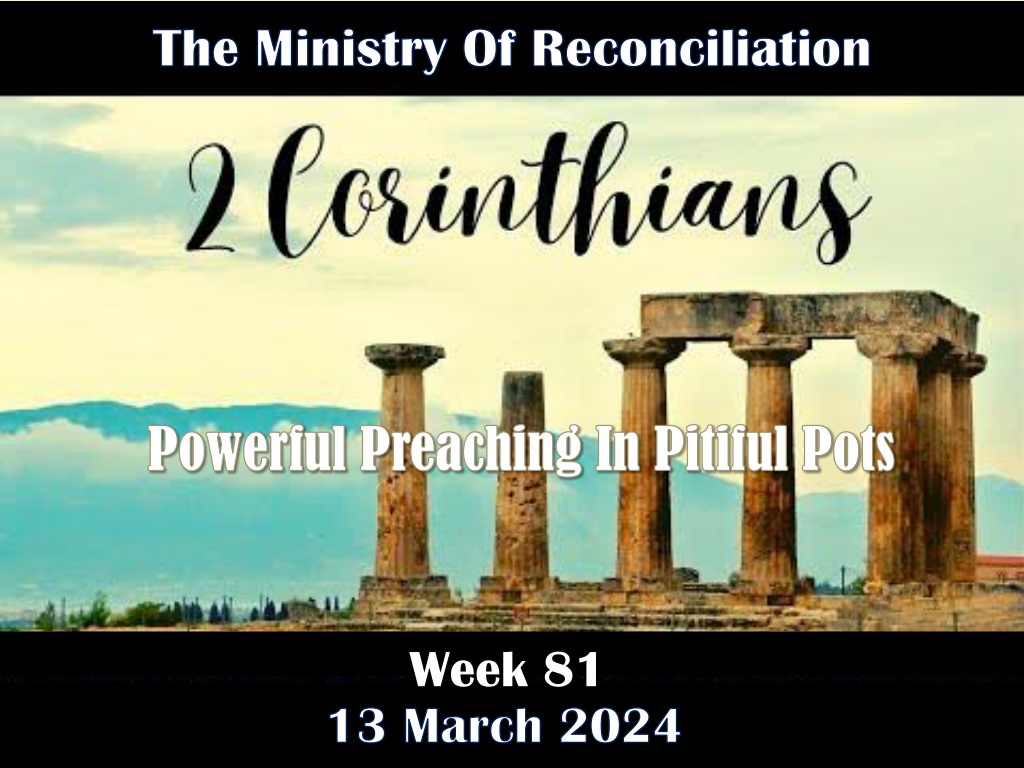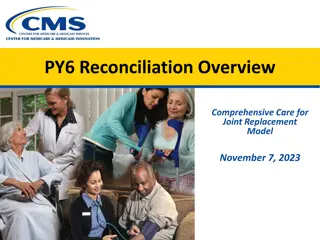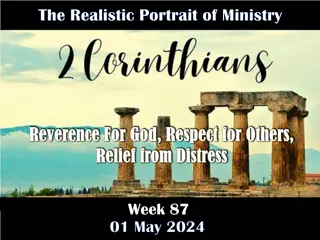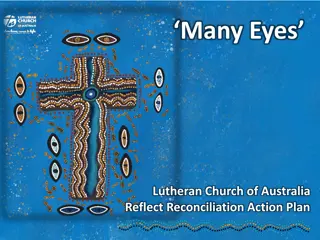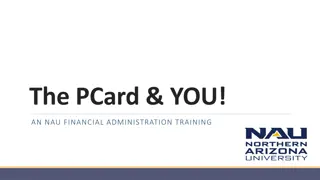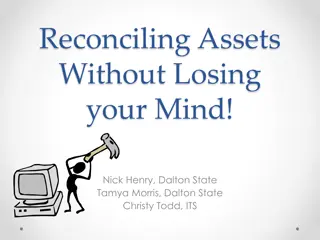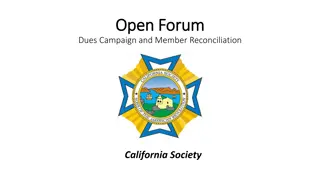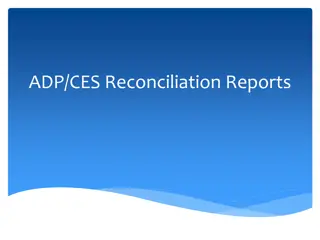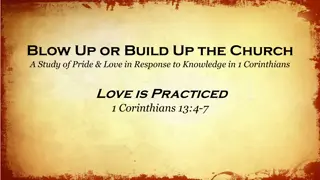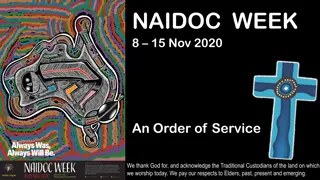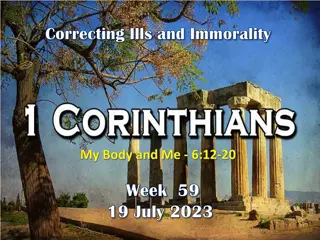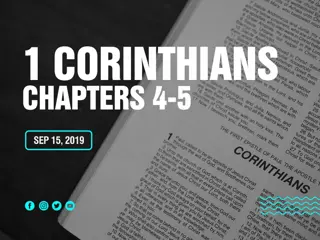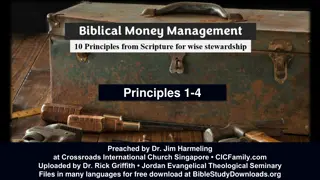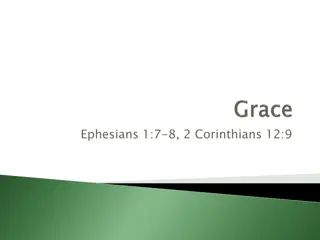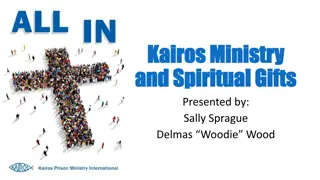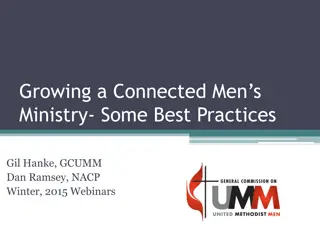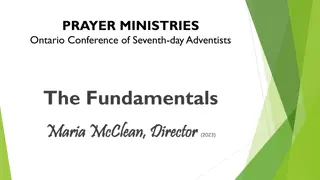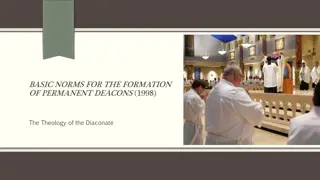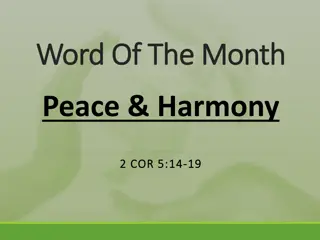Embracing Authentic Ministry: The Power of Reconciliation in 2 Corinthians
Explore how the theme of reconciliation intertwines with authentic Christian ministry in 2 Corinthians. Paul addresses challenges faced by the church, emphasizing the ministry of reconciliation through frail human vessels empowered by God's Spirit. Discover the call to reach unbelievers, train disciples, and persuade others to reconcile with God, embodying the essence of true ministry despite personal costs.
Download Presentation

Please find below an Image/Link to download the presentation.
The content on the website is provided AS IS for your information and personal use only. It may not be sold, licensed, or shared on other websites without obtaining consent from the author. Download presentation by click this link. If you encounter any issues during the download, it is possible that the publisher has removed the file from their server.
E N D
Presentation Transcript
The Ministry Of Reconciliation The Ministry Of Reconciliation Powerful Preaching In Pitiful Pots Powerful Preaching In Pitiful Pots Week 81 13 March 2024
2 CORINTHIANS INTRODUCTION As we embark upon a new focus in our study tonight, remember that the theme of Second Corinthians revolves around both the theological concepts and the practical aspects of Christian living. The primary issue at Corinth was the recognition of authentic ministry and submission to apostolic authority. Paul corrective was to provide guidance and encouragement as the church navigates the challenges that continues to influence their unity, discipline, and spiritual growth. This second letter has been divided into five sections, that focuses on various aspects of authentic Christian ministry.
2 CORINTHIANS INTRODUCTION In this new section, Paul addresses a variety of challenges and issues within the young church, including the church s ongoing struggles with spiritual immaturity. Christian life and ministry. He also unlocks one of the great mysteries of the God s power channeled through human weakness! of Reconciliation, Let s take a look at where we ve been and where we are going: As we begin our study in this new section, The Ministry 1) The Crucial Concerns of Ministry (1:1-3:18). Paul affirmed God s comfort in our affliction, including things like suffering, integrity, forgiving, our spiritual fragrance, and a new kind of covenant ministry.
2 CORINTHIANS INTRODUCTION 2) The Ministry of Reconciliation (4:1-5:21). 3) The Realistic Picture of Ministry (6:1-7:16). 4) The Self-Sacrificial Ministry (8:1-9:15). 5) The True Apostolic Ministry (10:1-13:14). In this Second Section, The Ministry of Reconciliation, Paul explains how God uses earthen vessels fashioned from clay, and filled with His Spirit to carry out this work of reconciling the world, through Christ Jesus, back to Himself.
2 CORINTHIANS INTRODUCTION In these lessons we learn exactly what we are called and equipped to do, to embrace authentic Christianity and encourage authentic ministry. We are earthen vessels, fashioned from clay, used to hold God s priceless treasures (4:7-12). We are frail and fallible ministers, filled with God s Spirit for the ministry of reconciling God and humanity (4:13- 18). Our heavenly mandate is to reach unbelievers for Christ and train them as disciples (5:1-10). We are God s authentic ministers striving to persuade others to reconcile with God, regardless of the personal cost to us (5:11-21).
2 CORINTHIANS INTRODUCTION While, God s original ministry of reconciliation may not line up well with the contemporary ministry models prevalent in our churches today. If we want to be true to Paul s vision of a fruitful ministry, we will strive to be ministers called to and engaged in a Ministry of Reconciliation.
2 CORINTHIANS - LESSON OVERVIEW Swindoll opens our study by painting a picture of Power he says . . . Power-mad people do not know what to do with Christ and the Cross. Somehow, the idea of the omnipotent God of the universe handing Himself over to death on a cross does not fit into any of the world s categories. When we think of power, we think of strength. So when nations want to display their power, they goose- step their soldiers up and down the street with tanks and missiles. Or they launch missiles and test bombs, rattling their sabers and flexing their military muscle so that other nations will consider them a force to be reckoned with. In the minds of the political world, that is power.
2 CORINTHIANS - LESSON OVERVIEW Personally, we build up our biceps and get ourselves into shape and we wear muscle shirts to show off our mighty physiques so nobody will mess with us. And when we cannot make ourselves look like a superhero, we seek to find power in our positions. We look for the careers that will make us the most money or allow us to handle people with the greatest control. We flex our metaphorical muscles by manipulating circumstances, calling the shots, and influencing people s lives with our smallest decisions. This kind of power bears no resemblance to the power of God displayed through Jesus Christ.
2 CORINTHIANS - LESSON OVERVIEW The most significant paradox in the history of time occurred about two thousand years ago when God in the flesh died, on a hill called Calvary. Omnipotence surrendered to impotence. The Lord, who had the power to call down angels from heaven and wipe out all the evildoers, in fact, did not. Instead, He became a lifeless corpse, dragged down from a cross and placed in a borrowed tomb. With this power paradox, in which strength is made perfect in weakness and the foolishness of the world becomes the wisdom of God . . . We should not be surprised that the ministry by which God reconciles the world to Himself is characterized by paradox.
2 CORINTHIANS - LESSON OVERVIEW So in 4:1-12, Paul highlights the great paradox of God s chosen messengers: The less these frail and fragile earthen vessels attract people to themselves, the more they display the glory of God.
2 CORINTHIANS 4:1-6 1Therefore, since we have this ministry, as we have received mercy, we do not lose heart. 2But we have renounced the hidden things of shame, not walking in craftiness nor handling the word of God deceitfully, but by manifestation of the truth commending ourselves to every man s conscience in the sight of God. 3But even if our gospel is veiled, it is veiled to those who are perishing, 4whose minds the god of this age has blinded, who do not believe, lest the light of the gospel of the glory of Christ, who is the image of God, should shine on them. 5For we do not preach ourselves, but Christ Jesus the Lord, and ourselves your bondservants for Jesus sake. 6For it is the God who commanded light to shine out of darkness, who has shone in our hearts to give the light of the knowledge of the glory of God in the face of Jesus Christ.
2 CORINTHIANS 4:1-6 Now building on the teachings in chapter 3, regarding the new covenant ministry of the Spirit, Paul builds a framework for his picture of effective, authentic ministry: Therefore, since we have this ministry, as we have received mercy, we do not lose heart (4:1). Just as we received mercy from Christ, we in turn show mercy toward others. When we floundered without help, neck-deep in misery, God stooped down through Christ and rescued us from our helpless predicament. Though we were muddied, soiled, and battered, He cleaned us and healed us, by His great mercy.
2 CORINTHIANS 4:1-6 And when we come to terms with God s amazing love for us, expressed through His mercy toward us, we will have consistent stability. Paul says, We do not lose heart (4:1). the mercy of God, we stand on our own two feet, enabled by His Spirit to walk strong and tall. Instead of returning to our old way of life, alienated from outward toward others, and motivate us to share this same mercy far and wide. God mercy should lifts our spirits, turn our attention on the right path, it must translate into action. While a correct mentality of mercyandstability sets us can be used by God to accomplish great things (4:2-4). Paul explains how our lives, once useless and ineffective,
2 CORINTHIANS 4:1-6 Paul, using himself as an example of a cleansed vessel prepared for the Master s service; after renouncing things hidden secretive and underhanded he models how to reject deceit. This stands in stark contrast to the charges of Paul s accusers in Corinth, who suggested he had been fickle and misleading in his ministry. Here, Paul makes it clear that its his accusers, not he and his associates, walking in craftiness and adulterating the word of God (4:2). Paul was the same person in public as in private. He did not tolerate duplicity in his life or in the lives of those who would seek to be ministers of the gospel.
2 CORINTHIANS 4:1-6 Unlike some popular preachers and teachers today, Paul refused to rely on cleverness, wit, and charm to woo people into the kingdom. He refused to play on peoples emotions. He knew that when you appeal to emotions to draw people in, you need to keep giving them an emotional fix to keep them coming. Instead, Paul relied on the unadulterated word of God to do its work (4:2). Paul strategy might appear old-fashioned compared to the glitz and glamour preachers we have today. He simply presented the plain, unvarnished truth of the gospel, depending on the Spirit of God to do His work through His word.
2 CORINTHIANS 4:1-6 Paul s plain preaching of the truth did not always result in massive numbers of converts or impressive emotional responses from his listeners. This plain approach to ministry often feels like talking with people who have no ability to hear, no way to see, and no disposition to believe (4:3). The gospel is veiled to those who are perishing, who remain on the fence and those who run from the truth. While the hearts and minds of unbelievers are indeed blinded by the enemy (4:4), authentic ministers of the gospel must continue to display truth, and stay clear of manipulation and guilt-inducing tactics that do not produce real, permanent results.
2 CORINTHIANS 4:1-6 We are reminded in Scripture, that only the conviction of the Holy Spirit through the Word of God can bring about a change of heart. For the word of God is alive and powerful. It is sharper than the sharpest two-edged sword, cutting between soul and spirit, between joint and marrow. It exposes our innermost thoughts and desires. Nothing in all creation is hidden from God. Everything is naked and exposed before his eyes, and he is the one to whom we are accountable. (Heb. 4:12-13,NLT) It is not our job to spiritual heart surgery; only God can accomplish that. Therefore, manipulative methods and tactics should never be part of our ministry approach.
2 CORINTHIANS 4:1-6 Rather, we should let the Spirit do His work through the Word, leaving us only one guaranteed way for removing the veil and piercing the dark cloud of deception that shrouds the hearts of unbelievers. We must preach the Word, even in our frailty. We must not preach ourselves drawing attention to our talents, gifts, resources and abilities. But rather preach Christ Jesus as Lord, to whom we are just bond-servants upon whom God has shown mercy (4:5). Any leader, spiritual or otherwise, can easily become a celebrity in the eyes of those being led. So when preachers build their egos on every word of praise . . .
2 CORINTHIANS 4:1-6 When they begin experiencing the phenomenon of fame, or when they start promoting themselves excessively, we have a real problem brewing. If your church s website mentions your pastor s name more than Jesus name, that is a problem. When a popular preacher s name and image are pasted all over the church, there are serious issues with pride and priorities. Paul continually pointed to Jesus Christ as Lord, never allowing those he taught to view him as anything more than an earthen vessel carrying priceless treasure. Swindoll ask this question, How do you know when you have let pride creep into your ministry?
2 CORINTHIANS 4:1-6 When you frequently talk about yourself and your accomplishments. When you expect special treatment and flaunt your privileges. When you excessively pursue promotions, bigger job titles, and higher pay. When you expect others to submit to your every word while allowing nobody to hold you accountable. When these attitudes and actions crop up in our life, we are headed for trouble. We need to step back until God regains full authority. When you see these attitudes in other leaders, it s time to distance ourselves from them. These are signs of a cult of personality, not a Christ- exalting ministry.
2 CORINTHIANS 4:7-12 7But we have this treasure in earthen vessels, that the excellence of the power may be of God and not of us. 8We are hard-pressed on every side, yet not crushed; we are perplexed, but not in despair; 9persecuted, but not forsaken; struck down, but not destroyed 10always carrying about in the body the dying of the Lord Jesus, that the life of Jesus also may be manifested in our body. 11For we who live are always delivered to death for Jesus sake, that the life of Jesus also may be manifested in our mortal flesh. 12So then death is working in us, but life in you.
2 CORINTHIANS 4:7-12 Now in 4:7, Paul introduces the heart of the matter that every believer is the recipient of a priceless treasure: the message of the gospel (4:7). This gospel message brings the light of knowledge to our darkened minds and empowers us to overcome our pride as we preach, Christ alone, by the power of the Holy Spirit. Because of the indwelling Spirit we have the power, contained in these pitiful pots, to preach the gospel with clarity. He describes these pitiful pots containing God s blessing as jars of clay. Meaning that born-again believers, just dirt, are the bearers of the light of the gospel of the glory of Christ, who is the image of God (4:4).
2 CORINTHIANS 4:7-12 Paul is saying, that we carry around in these earthen vessels our physical bodies, the presence of the Creator God who said Light shall shine out of darkness (4:6). Paul s emphasis is not strictly on the presence of God through the indwelling Holy Spirit, although that is essential to carrying out this work of ministry. But here Paul is primarily speaking about the gospel message itself. He saying that the message of the gospel is the treasure proclaimed through pitiful, brittle clay pots. God could have displayed His light through angelic beings, direct visions and dreams, or even through personal divine revelation to each individual.
2 CORINTHIANS 4:7-12 Yet, considering our frailties, fallen-ness, and our outright folly, God for His own purposes, decided to reveal this treasure through us. Even though on some days we are just unshaped and unattractive lumps of clay (Rom. 9:21),wispy clouds of dust (Gen. 3:19), with stony hearts (Prov. 28:14), and like withering grass (1Pet. 1:24). So, as Paul tries to be kind in his depiction, let s not forget the reality of our story, we are just clay pot. We should be honored and humbled to be included in God s plan to preserve and proclaim His priceless message.
2 CORINTHIANS 4:7-12 Today in our churches, we work hard to impress each other, especially visitors. We try to handle the Scriptures with ease and finesse. We polish our performance to perfection. We downplay our flaws and patch up the cracks in our finish. We place our must treasured pots on display for all to see, not revealing the invaluable treasure inside. Even when we are motivated to minister with excellence, to offer ourselves to God with our whole hearts. God is not pleased with a just wing it attitude or a hapless shoot- from-the-hip approach to ministry. That kind of attitude does not honor the treasure that God has entrusted to us. Remember, God delights in thoroughness, hard work, and excellence (Col. 3:23).
2 CORINTHIANS 4:7-12 Though a noble offering to God can easily cross the line into shameless showmanship. We must do and give our best in service to our God, we must never shine the spotlight on ourselves. Rather, we are to let God s light shine through us, so that, as Paul says in verse 7, the surpassing greatness of the power will be of God and not from ourselves. In 4:8-9, Paul reveals, these powerful images of, not only what he felt, but how we often feel as fragile earthen vessels. Afflicted Perplexed Persecuted Struck Down
2 CORINTHIANS 4:7-12 Afflicted, yet not crushed The Greek word thl b (the- lib'-bo), means to press in hard against or to squeeze out, it is related to our word for tribulation an intense and prolonged trial. Even while extreme pressure may squeeze us, we are not crushed. That is, the pressure never gets to the point where there is no escape or no way out (4:8). Perplexed, but not in despair The Greek word is apor (ap-or-ret'-o), it means to be at a loss for what to do, being unable to explain things, disoriented by the barrage of problems, mishaps, tragedies, and challenges. Yet, with all the confusion we are not in despair, Barclay says, we are at our wit s end but never at our hope s end (4:8).
2 CORINTHIANS 4:7-12 Persecuted, but not forsaken The Greek word di k (dee-o'-ko), it means to pursue, to systematically oppress and harass, the word is commonly used of tracking a prey or enemy. Even when we feel pursued and tracked down by the enemy, we are not forsaken. God never abandons us, nor does He leave us behind or in a lurch for the enemy to pick off (4:9). Struck Down, but not destroyed The Greek word is katab ll (kat-ab-al'-lo), it means to cast down, be thrown to the ground, to put in a lower place. When we are cast down or brought low, we are not destroyed. In other words, we will not perish, be lost, ruined or render useless (4:9).
2 CORINTHIANS 4:7-12 While our external tribulation and internal consternation comes as a result of being persecuted either physically, mentally, or emotionally. Yet, these attacks will not defeat nor destroy us. God will fight for us! Christ is never more visible in us than when others can find no other explanation for our hope and endurance through the trials of life. Than God s sustaining, strengthening power at work in us. When the clay pots are worn, chipped, or cracked then the glorious treasure can shine through.
2 CORINTHIANS 4:7-12 When as ministers of the gospel we reveals our own struggles, hardships, and weaknesses, it becomes much easier to see that it is God at work in us, both to will and to work for His good pleasure (Phil. 2:13). Powerful preaching in pitiful pots. That is the paradox of the Christian life in general and Christian ministry in particular. In these temporary jars of clay, we are always carrying about in the body the dying of Jesus, so that the life of Jesus also may be manifested in our body (4:10). So, as we are delivered over to pain, suffering, and even to death, the world can see the life of faith, hope, and love that comes only through the power of Jesus living in and through us (4:11).
2 CORINTHIANS 4:7-12 Paul and his apostolic companions carried the physical scars of suffering on behalf of Christ. These constant, visible reminders authenticated Paul s ministry, backing up his words with wounds. So when Paul refers to being delivered over to death, he is talking about the cracking of our pots. The affliction and persecution inherent in authentic ministry. In other words, when we die to self, Jesus can live in us. When we lose, Jesus wins. When we are weak, Jesus is strong. When we are last, Jesus is first. When we are dependent, Jesus is dependable. When our weaknesses show, people realize it is not the pot that is significant.
2 CORINTHIANS 4:7-12 But God s power within the pot that matters most. When others see this death in us, it changes them. Paul s reminder of the suffering and the lifestyle of self- surrender he and his follow workers displayed, should have challengedandchanged the Corinthian believers. Paul says it this way, Death works in us, but life in you (4:12).
Applications Applications of the of the Lesson Lesson Hide It Under a Bushel? No!
APPLICATION HIDE IT UNDER A BUSHEL? NO! In closing Swindoll says . . . The last time I checked, children still like to sing This Little Light of Mine in Sunday school hand motions and all. What a great way to instill in the hearts and minds of our little ones the passion to let the light of the gospel shine through our lives: Hide it under a bushel? No! I m going to let it shine! Here, in our lesson, the same idea stands behind Paul s principles for Spirit-empowered, Christ-centered ministry. That the light of the message of salvation shines from the pitiful pots of our mortal lives. We as minister don t hide the pots under a bushel. We let the light shine out of them.
APPLICATION HIDE IT UNDER A BUSHEL? NO! We don t let Satan hijack the pot and paint it with his worldly designs to distract people from its glorious content. We let the glory of the gospel shine through. We don t let our trials and tribulations drive us to despair and cause us to surrender the battle. We let the light shine until Jesus comes. To help us understand and apply our lesson, Swindoll offers twowarnings and a few ministry questions. First Warning Don t rush through the questions. If you meditate on them, the Spirit will use them to transform you. So think carefully. Second Warning Don t use these principles to judge the ministries of others. Instead, apply them to your own Christian walk and ministry.
APPLICATION HIDE IT UNDER A BUSHEL? NO! First set of questions: How do you live up to Paul s example of a faithful, effective minister of the gospel? Do you exhibit an abundance of mercy? A consistent stability? A rejection of deceit? An unwillingness to resort to manipulative gimmicks? A refusal to mishandle Scripture? A steadfast submission to Christ s lordship? A devotion to keeping the focus on the person and the work of Christ and not on yourself? Are the leaders and mentors in you life exhibiting these qualities, or have they adorned their earthen vessels so much that the message is being obscured?
APPLICATION HIDE IT UNDER A BUSHEL? NO! Second set of questions: How brightly does your light shine before other? Do you avoid spiritual topics for fear of your own inadequacies? Do you change the subject went your personal faith and convictions come up? Does your lifestyle reflect the purity of the gospel or the filthiness of the world? In short, how brightly does your light shine from the earthen vessel to which it has been entrusted. Third set of questions: Have you let the cracks, chips, and scratches on your earthen vessel distract you from keeping your own focus on the message?
APPLICATION HIDE IT UNDER A BUSHEL? NO! In fact, through our imperfections Christ is seen most clearly. Think of your own particular imperfections, scars, and challenges. How can they be used to point to Christ s grace, mercy, and power? Think about times in your life when you were most broken. How has God used them to influence others? Do you want to let your light shine before others? Make an impact in your work? Reach your school? Touch your neighbors? Heal your family? Then take the lid off your jar of clay and let the light of the glory of the gospel of Christ shine out of and through even the cracks of your broken life.
NEXT CLASS 20 March 2024 Before next class, read the below chapters in Before next class, read the below chapters in the the NKJV NKJV and in one other versions of the Bible, and in one other versions of the Bible, i.e., i.e., KJV KJV, , NRSV NRSV, , NIV NIV, , CEV CEV, , etc etc Chapter 4:13 18 The Right Focus
